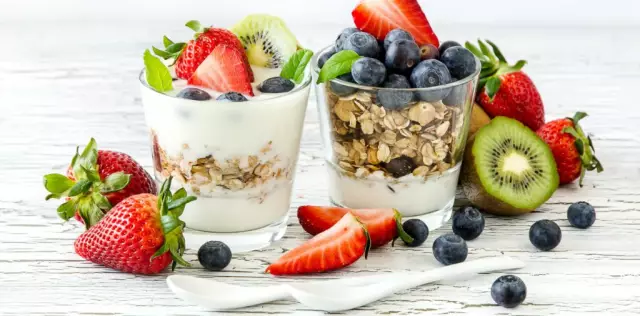- Author Rachel Wainwright wainwright@abchealthonline.com.
- Public 2023-12-15 07:39.
- Last modified 2025-11-02 20:14.
Greek yogurt

Greek yogurt is a traditional national Mediterranean product. It is imported to many countries of the world and is used both independently and as part of other dishes.
Natural Greek yogurt
Greek yogurt contains only natural ingredients. This product does not contain any artificial additives. Also, it completely lacks fats and a minimum of carbohydrates - 3%, instead, there is a record amount of protein - 46%; 25% is calcium.
In the process of making Greek yogurt, cultures of live bacteria are used - bifidobacteria, lactic acid coca and lactobacilli. The resulting product is rich in probiotics valuable for the human body.
By its appearance, Greek yogurt is completely different from the usual store-bought yoghurts - rather, it could be called fermented milk cream. Even a small amount of it gives a long-term feeling of fullness and does not cause a feeling of heaviness in the stomach.
Greek yogurt: recipes and benefits
There are several varieties of Greek yogurt. They differ in the type of milk used. Along with the traditional cow's milk, it can be sheep's or goat's milk. Having achieved the desired yoghurt consistency, the substrate is filtered to remove whey from it. The resulting creamy product is ready for use. Its taste is simultaneously similar to yogurt and soft cheese with a subtle sourness.
Today, industrial production of Greek yoghurt is established in many countries of the world. At the same time, sometimes the desired consistency is achieved by using thickeners and stabilizers, which is unacceptable in an authentic product.
The Greeks themselves prepare with it a popular national dish called "Dzadzyki": fresh cucumbers are mixed with chopped garlic and seasoned, according to the recipe, with Greek yogurt. Sometimes lemon juice, olive oil, herbs, olives or olives are added to it to taste. This delicious dish is served with a bread cake or as a sauce for the main course.
It is also added to meat and pie doughs. Greek yogurt can be simply spread on bread - perfect for a hearty, light dinner, and can be used in all dishes and dressings instead of mayonnaise. To diversify the taste of the product, you can add honey, cinnamon, flaxseed, fruits or berries, garlic, herbs, spices to it.
Low-calorie natural Greek yogurt is practically indispensable in the diet of people who monitor their own weight, because more energy is spent on digesting a large amount of protein. It has been proven that if you regularly include this excellent product in your diet for 4-5 months, you can lose more than 20% of your own weight.

Calcium, which is part of Greek yogurt, accelerates metabolic processes in the body and has a beneficial effect on the composition of bone tissue, and protein is necessary to ensure all vital processes (today, its deficiency is noted in most women over 40). It is also great for people who are lactose intolerant as it contains very little of it.
Numerous reviews of Greek yogurt by nutritionists rank it as the best food of the century. For its preparation, only fresh, unpasteurized milk is used, and a large number of lactic acid bacteria have a beneficial effect on the functioning of the gastrointestinal tract, and contribute to the prevention of oncological processes. They increase the quality level of digestive processes, stimulate the immune system and prevent the reproduction of pathogenic microflora. Good quality Greek yoghurt should not be stored for more than 1 month in a refrigerator.
Found a mistake in the text? Select it and press Ctrl + Enter.






